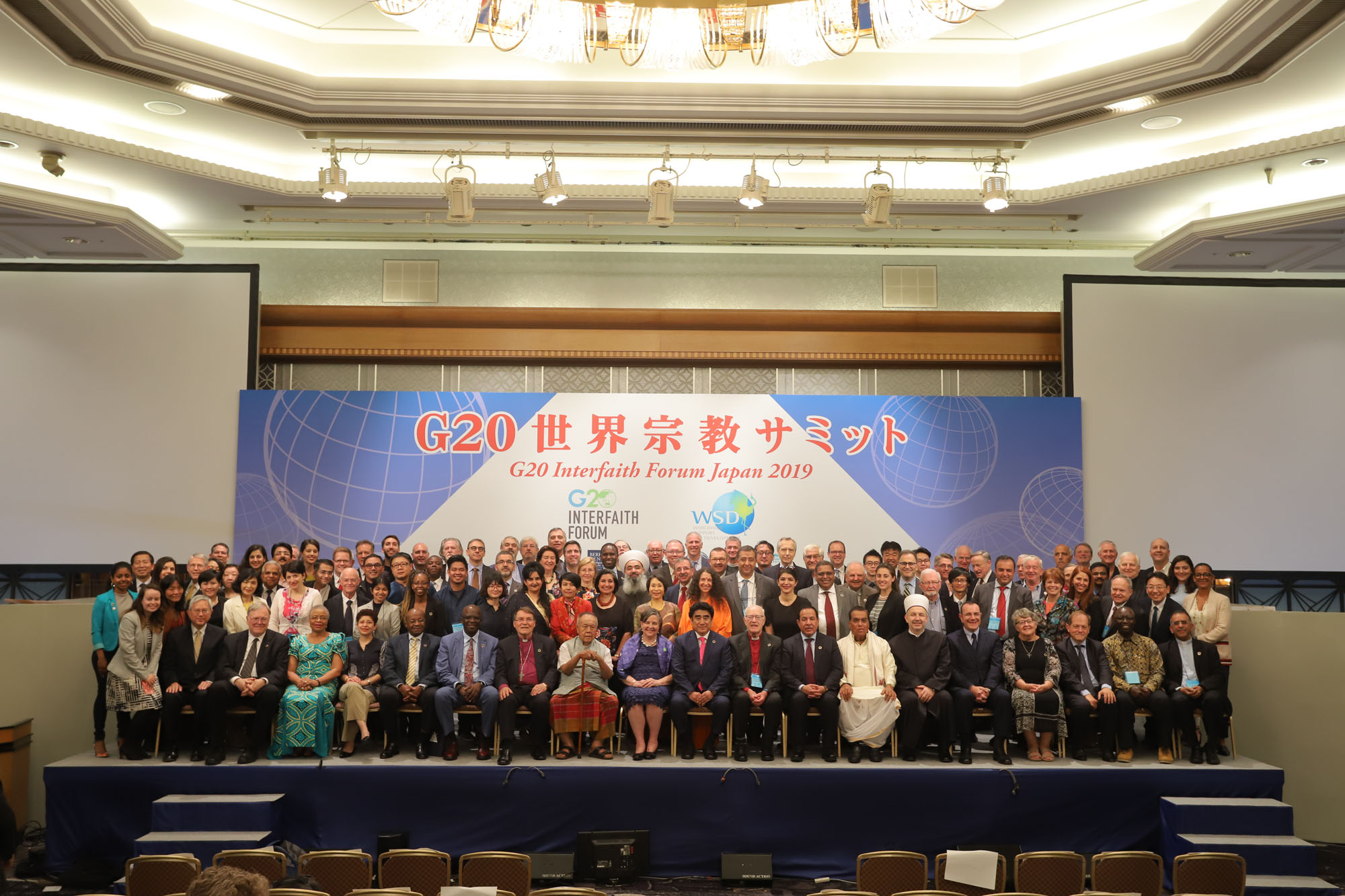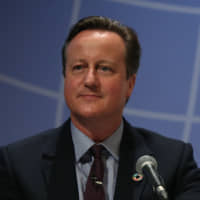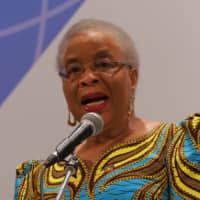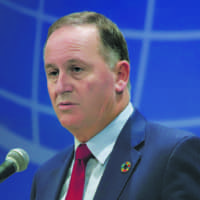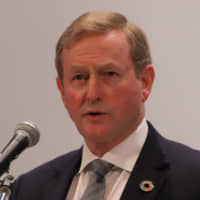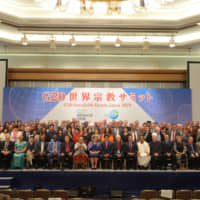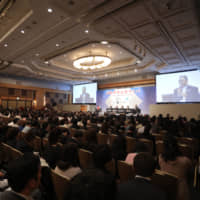Representatives from various religious groups, nonprofit organizations and former political leaders discussed world peace, welfare, environment and other global issues during the G20 Interfaith Forum Japan 2019 on June 8 and 9, with prominent speakers including former British Prime Minister David Cameron, former New Zealand Prime Minister John Key and former Irish Prime Minister Enda Kenny.
Key organizers of the forum, which had audiences of 4,000 and 34 speakers over the two days, were Worldwide Support for Development (WSD), the G20 Interfaith Forum Association, the World Faiths Development Dialogue (WFDD), and the King Abdullah bin Abdulaziz International Centre for Interreligious and Intercultural Dialogue (KAICIID), under the auspices of the Inter-Parliamentary Union and the Ministry of Foreign Affairs.
The organizers came up with policy recommendations based on their discussions for the G20 leaders, who met in Osaka on June 28 and 29 to discuss global issues.
The 2019 forum was the sixth, offering an annual platform where a network of religiously linked institutions and initiatives engage on global agendas, notably the U.N.’s Sustainable Development Goals (SDGs). Since 2014, the G20 Interfaith Forum has been held every year in the G20 summit host countries, issuing policy recommendations to urge G20 leaders to take action.
WSD Chairman Haruhisa Handa opened this year’s forum, held at Hotel New Otani Makuhari, in Chiba Prefecture, on June 8, stressing the need for religious voices to be included in the context of world peace and prosperity.
“G20 leaders cannot ignore religious leaders as 84 percent of the world’s population is religiously affiliated,” Handa said, referring to the demographic studies published in December 2012 by the Pew Research Center’s Forum on Religion and Public Life.
Handa’s opening remarks were followed by greetings from other leaders, including WFDD Executive Director Katherine Marshall, KAICIID Secretary General Faisal bin Abdulrahman bin Muaammar and Cole Durham, founding director of the International Center for Law and Religion Studies at Brigham Young University and chairman of the G20 Interfaith Forum.
Following the remarks, the first session, “Why We Can Hope: Peace, People and Planet,” kicked off with remarks from Cameron, who argued that politics should address and correct economic and social segregation.
Threats mankind is facing, such as poverty, have basically not changed over time, and the world should be united to tackle such problems, he commented, adding that world unity is getting stronger as the G20 and other platforms promote international cooperation.
“It is important that countries cooperate with each other. Dialogue is important, but we need concrete action,” he said.
Cameron then stressed the importance of economic growth, saying Britain achieved growth during his tenure, creating employment. Eradicating poverty, securing access to clean water and doing other things for poor countries requires money, and thus leadership by wealthy countries is necessary.
Following Cameron’s speech, a panel discussion was held with Cameron, Kenny, Key and Graca Machel, an advocate for women and children. Machel is also the widow of both South African President Nelson Mandela and Mozambican President Samora Machel.
Regarding refugees, Machel argued that 85 percent of refugees in the world flee to developing countries and the scale of refugee movement is growing. She dismissed an allegation that refugees increase terrorism as this stems in part from irresponsible voices on social network sites.
Key echoed Machel as there are many different types of terrorists, noting that the March mosque shooting in Christchurch, New Zealand, was not perpetrated by refugees. Countries should maintain proper programs to accept refugees, he said.
Referring to the SDGs, Cameron said he contributed to the creation of Goal 16, which promotes just, peaceful and inclusive societies, in the process of creating the SDGs — successors of the Millennium Development Goals — as justice is essential to taking sustainable measures to tackle poverty.
The second session, “Action Agendas: Testing Ideas with Experience from Field Realities,” began with a greeting by Koichi Hagiuda, executive acting secretary-general of the Liberal Democratic Party.
“Japanese live their lives cherishing peace,” said Hagiuda, who read a message from Prime Minister Shinzo Abe. “I believe in the significance of the G20 Interfaith Forum Japan 2019 and I have high expectations for its positive influence.”
A panel discussion followed, moderated by former Archbishop of Canterbury George Carey. The panelists were Gerrit Gong of the Quorum of the Twelve Apostles of the Church of Latter-day Saints; Bishop Emeritus of Oslo Gunnar Stalsett; Denise Coghlan of the Jesuit Refugee Service in Cambodia and a Nobel Peace Prize laureate; KAICIID Senior Advisor Mohammed Abu-Nimer; Ganoune Diop, director of Public Affairs and Religious Liberty, of the Seventh-day Adventist Church; and Adventist Development and Relief Association President Jonathan Duffy.
Gong discussed the importance of environmental preservation by quoting the late Emperor Showa, “Why haven’t I seen butterflies lately?” He also noted local volunteers in Haiti’s efforts to plant 25,000 trees, stressing the need to initiate more such activities. Stalsett talked about movements looking to secure equal rights for all ethnic groups in Myanmar.
Coghlan focused on youths, calling for the eradication of human trafficking. “Slave labor and human trafficking are crimes against humanity,” she said. Abu-Nimer stressed the need to understand and accept differences and noted that dialogue is essential.
Diop warned there are still many children displaced from their homes due to war and violence, while Duffy urged better representation for children’s rights.
On June 9, the first session’s theme was “Ideas to Action.” WFDD’s Marshall greeted the audience before speeches by Machel and Key.
Machel focused on the importance of education for children and the necessity of providing education for refugee children.
She pointed out that 91 percent of the world’s non-refugee elementary children attend school, while only a half of refugee children attend school, referring to statistics by UNICEF and the U.N. High Commissioner for Refugees.
“Refugee children deserve mental and physical care,” Machel said, adding that pregnant and child-rearing refugees also need adequate nutrition as the first 1,000 days are critical for babies to have healthy bodies.
“We must demand that governments, nongovernmental organizations and society contribute to the education of refugees,” she said.
She also stressed the importance of the transition from elementary to secondary education for refugees, referring to the UNHCR statistics that show only 23 percent of refugee children attend secondary schools.
She quoted the main mantra of SDGs, “Leave no one behind,” and urged the international community to take action.
New Zealand’s Key raised hopes that it is “human nature that we want to help,” referring to donations and volunteers after the quakes and tsunami in Japan following the March 2011 Great East Japan Earthquake and tsunami and similar aid offered to other countries after disasters.
“I have hope that it is human nature to help people,” he said.
He also mentioned that it is human nature to forgive, referring to his reflection after his trips to Hiroshima Peace Park.
Key then turned to achievements made in terms of SDGs in recent years. Access to clean water has improved, poverty has decreased and education has dramatically improved, he said.
“Yes, we have great concerns, but most importantly, we have hope,” he said.
The following panel discussion, moderated by U.N. Population Fund Senior Advisor Azza Karam, was joined by Ishmael Noko, former general secretary of the Lutheran World Federation; Audrey Kitagawa, chair, Parliament of the World’s Religions; U.S. Agency for International Development General Counsel David Moore; and Joshtrom Isaac Kureethadam, director of the Ecology Department, Vatican Dicastery for Promoting Integral Human Development.
Noko expressed gratitude for the success of the forum and sensed the “birth of a new community” from it. Kitagawa emphasized that the dialogue platform is “extremely important” and said she benefited from “heart-to-heart connections.”
Moore stressed the significance of religion’s role while Kureethadam reminded the audience to think of the poorest and weakest first.
The next session, whose theme was “Towards 2020,” began with a speech by Ireland’s Kenny.
“Over the last two days, (we’ve had) so many discussions, (and shared) experiences and (much) wisdom,” Kenny said. Referring to various harsh realities discussed such as refugees and poverty, he shouted to the audience: “Do we care? Yes we do.”
He then highlighted Ireland as a small, immigrant country. “We have five or six different nationalities in classrooms” at school, he said, adding that immigrants are the source of Ireland’s prosperity. Additionally, he noted that churches and the state work well together in Ireland.
Acknowledging that political leaders have been helping solve global problems, he admitted that the problems are not easy to completely resolve.
“We should not be afraid. I hope we can go from strength to strength,” he said.
The following panel discussion was joined by Juan Navarro Floria, professor of law, Pontificia Universidad Catolica; KAICIID Deputy Secretary General Alvaro Albacete; the Maharashtra Academy of Engineering Education and Research, Maharashtra Institute of Technology and World Peace University Executive President Rahul Karad; and Kim Tran, a core member of Fridays for Future Japan. They also discussed various global issues and measures to improve different situations.
The final session, “Closing Plenary,” began with a panel discussion between Katsuei Hirasawa, former state minister of the Cabinet Office; Muaammar; Osama Al Azhari of the Inter-Parliamentary Union; and Jan Figel, special envoy for the Promotion of Freedom of Religion or Belief Outside the European Union, European Commission.
Hirasawa, a former National Police Agency official, argued against the notion that an increase in foreigners leads to an increase in crime. He also said the purpose of the recent revision of the immigration control law is to properly manage foreign residents to protect their rights.
In concluding remarks, Handa mentioned that nobody had really discussed Shintoism and explained that Japan “divides the sacred and the secular and makes them coexist.”
Durham gave special thanks to many participants of the forum.
The G20 Interfaith Forum Japan 2019 is one of many international symposiums held by WSD. In March last year, WSD held the fourth Global Opinion Leaders Summit, at which former U.S. President Barack Obama spoke about denuclearization and world peace, in Tokyo. In the past symposiums, WSD has seen the attendance of former U.S. President Bill Clinton, former British Prime Minister Tony Blair, among other former world political leaders.
WSD is also engaged in AIDS eradication activities in Lesotho and supports orphanages and carries out other philanthropic activities in developing countries.
Handa is involved in activities in many other fields; he is the chairman of the International Foundation for Arts and Culture, the Tokyo Art Foundation and the International Sports Promotion Society.
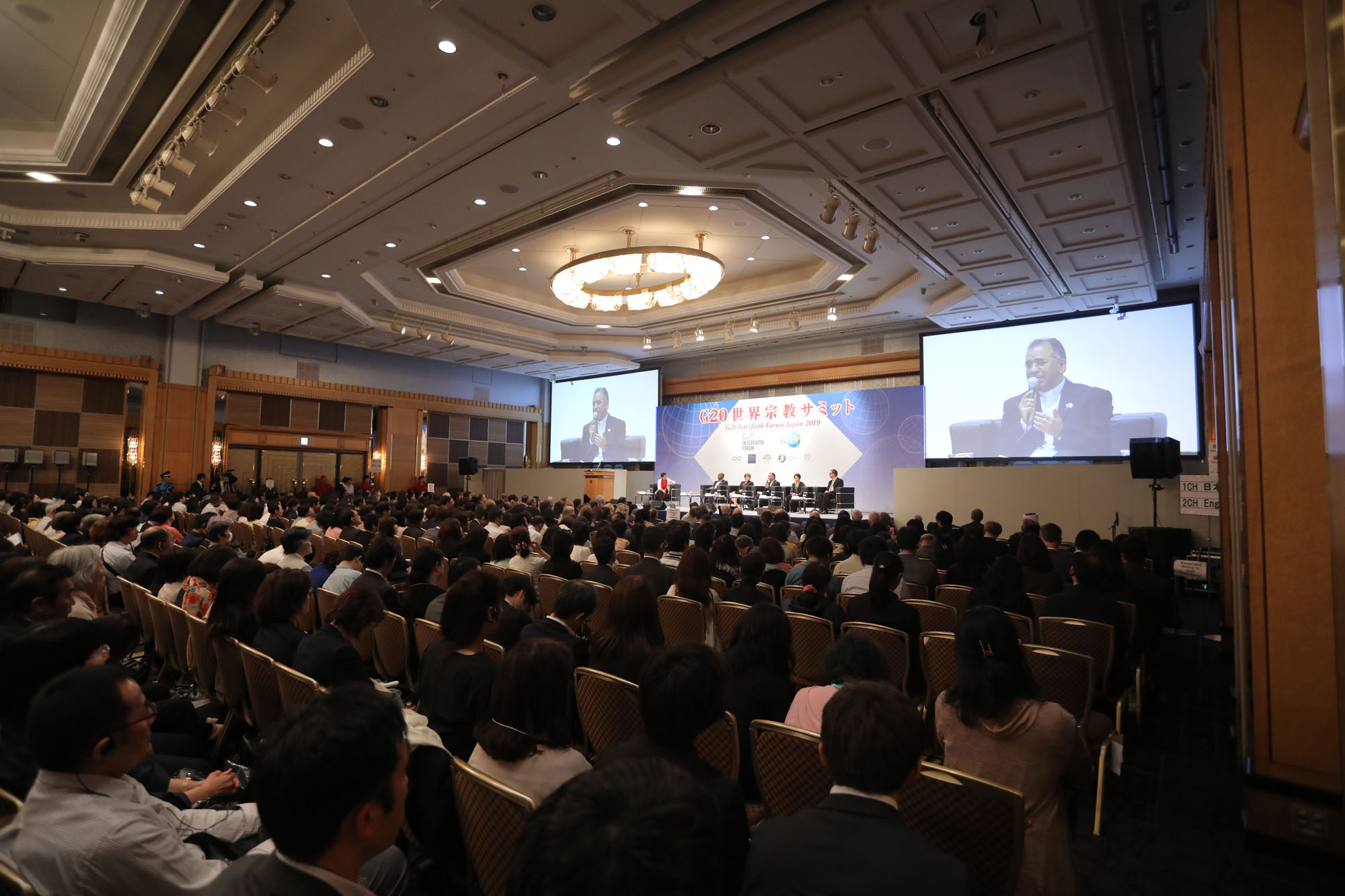
Breakdown of policy proposals
• Commit to working for peace in collaboration with faith actors, with a new framing of religious roles in conflict and polarization.
• Focus sharply and explicitly on the needs of children and commit resources vital to address those needs.
• Put resources behind promises to protect the planet, focusing in particular on rainforests in partnership with religious, ingenuous and local actors.
• Bolster action to strengthen rule of law and protection of human rights, with particular emphasis on freedom of religion or belief and action to fight against corruption.
• Initiate and commit to global and national measures to combat trafficking and modern slavery as part of long-term G20 priority.
Hopes of sharing Shintoism as a basis for religious coexistence
It is significant the G20 Interfaith Forum Japan 2019 was held in Japan because the Japanese have the qualifications to become world religious leaders, Worldwide Support for Development (WSD) Chairman Haruhisa Handa said.
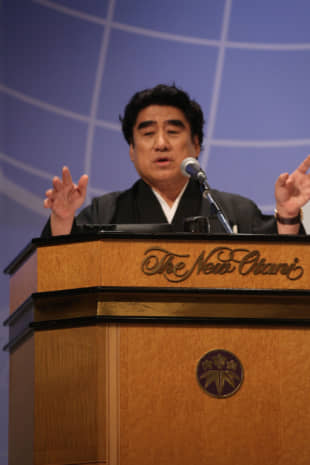
“Japanese should be religious leaders in the world because we are very generous and willing to accept what is good,” Handa said during a news conference after the forum.
It was the sixth G20 Interfaith Forum, which offers an annual platform where a network of religiously linked institutions and initiatives engage on global agendas. Since 2014, the forum has been held annually in the country where G20 summits have taken place.
Handa hopes the forum in Japan will be an opportunity for the world to learn the uniqueness of Shintoism, the basis of the Japanese trait that allows multiple religions to coexist in harmony.
World Faiths Development Dialogue Executive Director Katherine Marshall had asked Handa to co-organize the Japan forum “two or three times,” Handa said, adding that he thought he would have to “do it for Japan.”
The forum had many prominent guests, including those with whom Handa has personal connections, such as former New Zealand Prime Minister John Key and former Irish Prime Minister Enda Kenny, both of whom are patrons of WSD.
They share a connection with former British Prime Minister David Cameron, another prominent guest of the forum, who served as the leader of his country around the same time as the other two.
Handa enjoys playing golf with many leaders, including Key and Kenny, both of whom have been patrons and global ambassadors for the International Sports Promotion Society (ISPS), a sports charity, founded by Handa.



